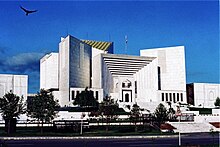Sheikh Anwarul Haq | |
|---|---|
| شیخ انوار الحق | |
 | |
| 9th Chief Justice of Pakistan | |
| In office 23 September 1977 – 25 March 1981 | |
| Nominated by | Zulfikar Ali Bhutto |
| Appointed by | Fazal Ilahi Chaudhry |
| Preceded by | Yaqub Ali |
| Succeeded by | Mohammad Haleem |
| Acting President of Pakistan | |
| In office 20 April 1978 – 7 May 1978 | |
| Preceded by | Fazlul Qadir Chaudhry (29 November 1963 – 12 June 1965) |
| Succeeded by | Wasim Sajjad (18 July 1993 – 14 November 1993) |
| Senior Justice of the Supreme Court of Pakistan | |
| In office 16 October 1972 – 23 September 1977 | |
| Nominated by | Zulfikar Ali Bhutto |
| Personal details | |
| Born | Sheikh Anwarul Haq 11 May 1917 Jullundur, Punjab, British India |
| Died | 3 March 1995 (aged 77) Lahore, Punjab, Pakistan |
| Citizenship | |
| Nationality | Pakistani |
| Alma mater | Punjab University |
| Profession | Jurist |

Sheikh Anwarul Haq (Punjabi and Urdu: شیخ انوار الحق; 11 May 1917 – 3 March 1995), was a Pakistani jurist and an academic who served as the 9th Chief Justice of Pakistan from 23 September 1977 until resigning on 25 March 1981. He signed the death warrant for former Prime Minister Zulfikar Ali Bhutto in a controversial murder case. Bhutto was executed on April 4, 1979.[1][2][3]
Educated as an economist at the DAV College and the Punjab University in Lahore, he served as a civil servant of the Indian Civil Service as an appointee to lead the municipal governance in the British India in 1944. He continued serving in the civil service after the independence of Pakistan as a result of partition of British India in 1947 and subsequently elevated as a judge in the Sindh High Court in 1957.
In 1962, he was nominated to serve on the Supreme Court and later appointed as Chief Justice of Lahore High Court in 1970 before his reappointment as a Senior Justice of the Supreme Court of Pakistan in 1971. He 1972, he earned public and international notability when he co-chaired the War Enquiry Commission with Chief Justice Hamoodur Rahman to investigate the economic and military collapse of Pakistan in a war against India in 1971 that led to the separation of East Pakistan as Bangladesh.
He was known for his judicial conservative philosophical leanings and is noted in country's political history for providing legality for the martial law upheld by chief of army staff General Zia-ul-Haq to restore law and order, in light of doctrine of necessity, as part of his conservative leanings.[2] He also heard the case of Zulfikar Ali Bhutto as Chief Justice of the Supreme Court of Pakistan and constituted a 7-member (7 supreme court judges) bench to decide on the appeal of the capital sentence by the Lahore High Court for authorizing the death sentence of the ex-Prime Minister of Pakistan.[1][4] After the death sentence of Zulfiqar Ali Bhutto, who was convicted of murdering through proxy the father of one of his political opponents, Anwarul Haq took up the case against General Zia-ul-Haq's breaking his promise of holding elections. General Zia-ul-Haq introduced the PCO to legitimise his rule to by-pass the issues presented with this case and asked all the judges to sign an agreement accepting the PCO. Anwarul Haq notably refused to take an oath under the imposed PCO, resigning on conscientious grounds.[3] He also mobilised other like minded judges in the Supreme Court and High Courts to reject the proposed PCO by not signing the PCO. He was removed as Chief Justice of the Supreme Court of Pakistan due to his refusal to sign the PCO.
- ^ a b Shaikh Aziz (21 December 2014). "A leaf from history: Supreme Court rejects Bhutto's appeal". Dawn (newspaper). Retrieved 7 November 2021.
- ^ a b Burki, Shahid Javed (19 March 2015). Historical Dictionary of Pakistan (page 73). Rowman & Littlefield. ISBN 9781442241480.
- ^ a b "Chief Justice Anwar ul Haq (profile)". KPPSC website. Archived from the original on 11 September 2016. Retrieved 7 November 2021.
- ^ Constable, Pamela (19 July 2011). Playing with Fire: Pakistan at War with Itself. Random House Publishing. p. 219. ISBN 9780679603450.